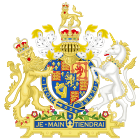Blasphemy Act 1697 facts for kids
| Act of Parliament | |

|
|
| Long title | An Act for the more effectual suppressing of Blasphemy and Profaneness. |
|---|---|
| Citation | 9 Will. 3. c. 35 (Ruffhead: 9 & 10 Will. 3. c. 32) |
| Territorial extent | England and Wales |
| Dates | |
| Royal assent | 5 July 1698 |
| Repealed | 21 July 1967 |
| Other legislation | |
| Amended by | Doctrine of the Trinity Act 1813 |
| Repealed by | The Criminal Law Act 1967, section 13(2) and Part I of Schedule 4 |
|
Status: Repealed
|
|
| Text of statute as originally enacted | |
The Blasphemy Act 1697 was a law passed by the Parliament of England in 1697. This Act made it against the law for people who were Christian to say or write things that went against Christian beliefs. This included saying there was more than one God, denying the idea of the Holy Trinity, or saying the Christian religion or the Bible wasn't true.
If someone broke this law once, they couldn't hold important jobs in the government or public service. If they broke it a second time, the punishments were much tougher. They couldn't sue anyone, be a guardian for someone, or even receive gifts or money left in a will. They also faced three years in prison.
This law was mainly aimed at people who were turning away from traditional Christian beliefs. It was passed around the time when new ideas about religion, called Deism, were becoming popular in England. For example, it was a response to books like Christianity not Mysterious by John Toland, published in 1696.
Why the Act Was Rarely Used
This law wasn't used very often. There was only a short time (four days) to report someone after they broke the law. Also, trials had to happen quickly, within three months. Because of these strict rules, older, more general laws were usually used instead to deal with people who had different religious views.
Changes and Repeal
Over time, parts of the Act were changed. In 1813, the Doctrine of the Trinity Act 1813 made sure that people called Unitarians, who had different ideas about the Trinity, wouldn't be punished under this law.
The Law Commission, a group that looks at laws, said they didn't know of anyone ever being punished using this specific Act. In 1966, the Law Commission suggested that the Blasphemy Act 1697 was outdated and should be removed from the law books. This recommendation was followed, and the Act was officially repealed (cancelled) on 21 July 1967 by the Criminal Law Act 1967.
See also
- Blasphemy law in the United Kingdom
Sources
- Webb, R.K. "From Toleration to Religious Liberty" Liberty Secured? Britain before and after 1688 Edited by J.R. Jones (Stanford: Stanford University Press, 1992) p 162 ISBN: 0-8047-1988-8
 | Percy Lavon Julian |
 | Katherine Johnson |
 | George Washington Carver |
 | Annie Easley |

